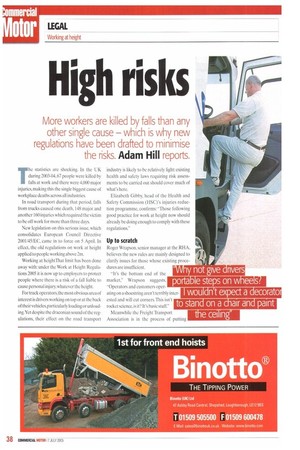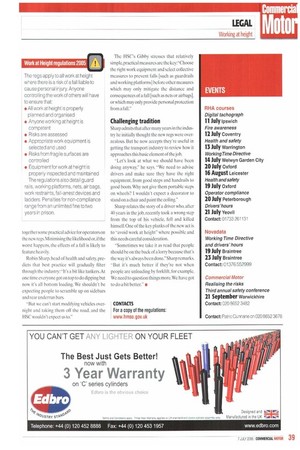More workers are killed by falls than any
Page 40

Page 41

If you've noticed an error in this article please click here to report it so we can fix it.
other single cause — which is why new regulations have been drafted to minimise the ris(s. Adam Hill reports.
The statistics are shocking. In the UK during 2003-04,67 people were killed by falls at work and there were 4,000 major injuries, making this the single biggest cause of workplace deaths across all industries.
In road transport during that period, falls from trucks caused one death, 148 major and another 160 injuries which required the victim to he off work for more than three days.
New legislation on this serious issue, which consolidates European Council Directive 2001/45/EC, came in to force on 5 April. In effect, the old regulations on work at height applied to people working above 2m.
Working at heightThat limit has been done away with: under the Work at Height Regulations 2005 it is now up to employers to protect people where there is a risk of a fall liable to cause personal injury, whatever the height.
For truck operators, the most obvious area of interest is drivers working on top or at the back of their vehicles,particularly loading or unloading.Yet despite the draconian sound of the regulations, their effect on the road transport industry is likely to be relatively light: existing health and safety laws requiring risk assessments to be carried out should cover much of what's here.
Elizabeth Gibby. head of the Health and Safety Commission ( HSC)'s injuries reduction programme, confirms: -Those following good practice for work at height now should already be doing enough to comply with these regulations."
Up to scratch Roger Wrapson, senior manager at the RHA, believes the new rules are mainly designed to clarify issues for those whose existing procedures are insufficient.
-It's the bottom end of the market," Wrapson suggests. "Operators and customers operating on a shoestring aren't terribly interested and will cut corners. This isn't rocket science, is it? it's basic stuff."
Meanwhile the Freight Transport Association is in the process of putting together some practical advice for operators on the new regs. Minimising the likelihood or,if the worst happens, the effects of a fall is likely to feature heavily.
Robin Sharp, head of health and safety, predicts that hest practice will gradually filter through the industry:"It's a bit like tankers. At one time everyone got on top to do dipping but now it's all bottom loading. We shouldn't be expecting people to scramble up on sidebars and rear underrun bars.
-But we can't start modifying vehicles overnight and taking them off the road, and the HSC wouldn't expect us to." The HSC's Gibby stresses that relatively simple,practical measures are the key:"Choose the right work equipment and select collective measures to prevent falls [such as guardrails and working platforms] before other measures which may only mitigate the distance and consequences of a fall [such as nets or airbags], or which may only provide personal protection from a fall."
Challenging tradition
Sharp admits that after many years in the industry he initially thought the new regs were overzealous, But he now accepts they're useful in getting the transport industly to review how it approaches this basic element of the job.
"Let's look at what we should have been doing anyway," he says. "We need to advise drivers and make sure they have the right equipment, from good steps and handrails to good boots. Why not give them portable steps on wheels? I wouldn't expect a decorator to stand on a chair and paint the ceiling."
Sharp relates the story of a driver who, after 40 years in the job, recently took a wrong step from the top of his vehicle, fell and killed himself. One of the key planks of the new act is to "avoid work at height" where possible and this needs careful consideration.
-Sometimes we take it as read that people should be on the back of a lorry because that's the way it's always been done," Sharp remarks. "But it's much better if they're not when people are unloading by forklift, for example. We need to question things more. We have got to do a hit better.•










































































































































































































